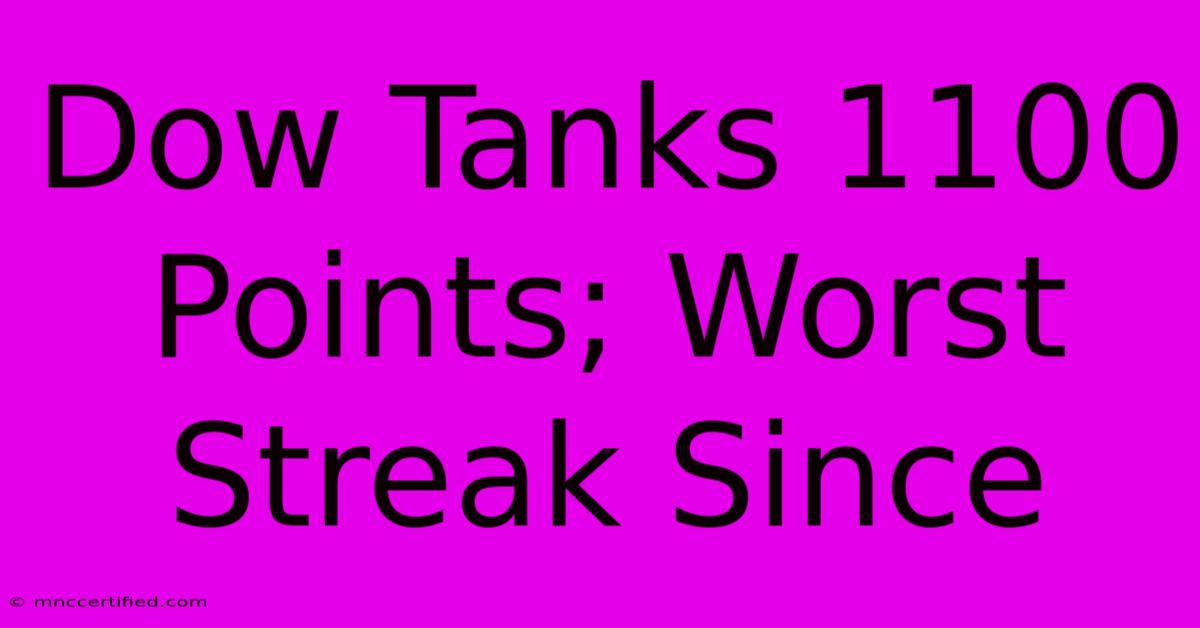Dow Tanks 1100 Points; Worst Streak Since

Table of Contents
Dow Tanks 1100 Points; Worst Streak Since [Date] – A Deep Dive into the Market Crash
The Dow Jones Industrial Average plummeted over 1100 points today, marking its worst single-day point drop since [Insert Date of Previous Significant Drop]. This dramatic fall continues a concerning downward trend, sparking widespread anxieties about the current state of the economy and the future of the stock market. This article will delve into the factors contributing to this significant market downturn, explore its potential consequences, and offer insights into navigating this period of volatility.
Understanding the Magnitude of the Drop
A loss of 1100 points in the Dow is not just a number; it represents a significant erosion of investor confidence and a substantial shift in the market landscape. This is especially concerning given the [Number] consecutive days of negative performance leading up to today's drop, representing the worst streak since [Insert Date and Context of Previous Worst Streak]. This prolonged decline underscores a deeper underlying issue than just a single day's bad news.
Key Factors Contributing to the Dow's Decline
Several factors are interwoven, creating a perfect storm that fueled today's market crash:
-
Rising Interest Rates: The Federal Reserve's continued efforts to combat inflation through interest rate hikes are significantly impacting borrowing costs for businesses and consumers. This reduces investment and spending, slowing economic growth. High interest rates are a major headwind for market performance.
-
Inflationary Pressures: Persistent inflation continues to erode purchasing power and is forcing businesses to increase prices, potentially leading to a wage-price spiral. Persistent inflation is a key concern for investors and the Federal Reserve.
-
Geopolitical Uncertainty: The ongoing [Mention Specific Geopolitical Event, e.g., war in Ukraine, tensions with China] adds significant uncertainty to the global economic outlook, further impacting investor sentiment. Geopolitical risks are a significant factor influencing market volatility.
-
Concerns about a Recession: The combination of high interest rates, persistent inflation, and geopolitical instability is fueling growing concerns about a potential recession. Recession fears are driving investors to seek safer investments, leading to market sell-offs.
The Impact on Investors and the Economy
The consequences of this significant market downturn are far-reaching:
-
Investor Losses: Individual investors and institutional portfolios have experienced substantial losses, potentially impacting retirement savings and investment strategies. Protecting investments during periods of high volatility is crucial.
-
Reduced Consumer Spending: Market uncertainty and potential job losses can lead to reduced consumer spending, further slowing economic growth. Consumer confidence is a key indicator of economic health.
-
Business Investment Slowdown: Businesses may postpone or cancel investment plans due to economic uncertainty, impacting job creation and economic expansion. Business investment plays a crucial role in driving economic growth.
Navigating Market Volatility: Strategies for Investors
While the current market situation is challenging, investors can take steps to mitigate risks and potentially capitalize on opportunities:
-
Diversification: Maintaining a diversified investment portfolio across different asset classes is crucial to minimize risk. Diversification is a cornerstone of sound investment strategy.
-
Risk Management: Understanding your risk tolerance and adjusting your investment strategy accordingly is paramount. Risk assessment is crucial for informed decision-making.
-
Long-Term Perspective: It is essential to maintain a long-term investment perspective and avoid making impulsive decisions based on short-term market fluctuations. Long-term investing often yields better results than short-term trading.
-
Professional Advice: Seeking advice from a qualified financial advisor can provide valuable insights and guidance during periods of market volatility. Financial planning is crucial for navigating economic uncertainty.
Conclusion: Looking Ahead
The Dow's 1100-point drop reflects a confluence of significant economic and geopolitical factors. While the current market outlook is uncertain, understanding the underlying causes and implementing sound investment strategies can help investors navigate this period of volatility and position themselves for future opportunities. Continued monitoring of economic indicators and geopolitical events will be crucial in assessing the trajectory of the market in the coming weeks and months. The situation remains fluid, and staying informed is paramount.
Keywords: Dow Jones, Stock Market Crash, Market Volatility, Interest Rates, Inflation, Recession, Geopolitical Uncertainty, Investment Strategy, Risk Management, Financial Planning, Economic Outlook.

Thank you for visiting our website wich cover about Dow Tanks 1100 Points; Worst Streak Since. We hope the information provided has been useful to you. Feel free to contact us if you have any questions or need further assistance. See you next time and dont miss to bookmark.
Featured Posts
-
Live Perez Future Uncertain At Red Bull
Dec 19, 2024
-
Channel 4 Loses Simpsons 2024 Update
Dec 19, 2024
-
Schwarzenegger To Star As Santa In New Movie
Dec 19, 2024
-
Carabao Cup Arsenal Vs Crystal Palace Live Stream
Dec 19, 2024
-
Bridgewaters Nfl Return Coaching Stint
Dec 19, 2024